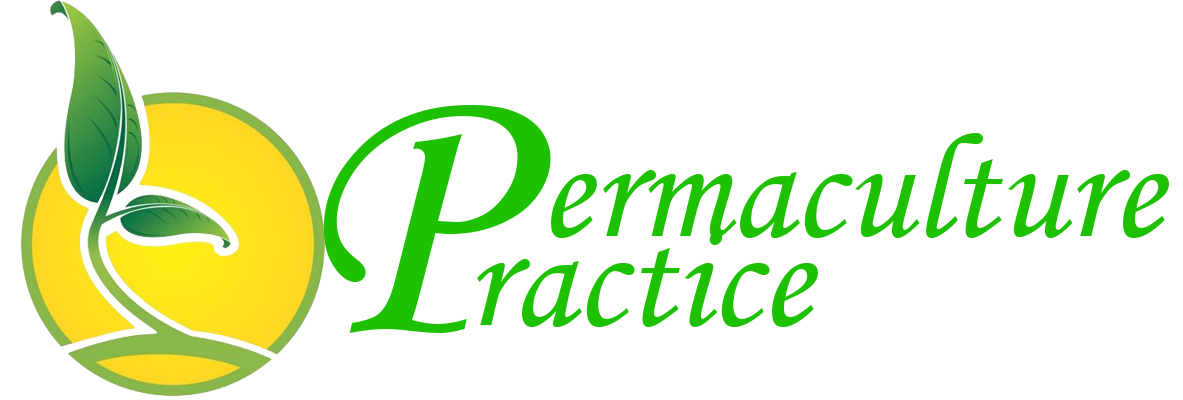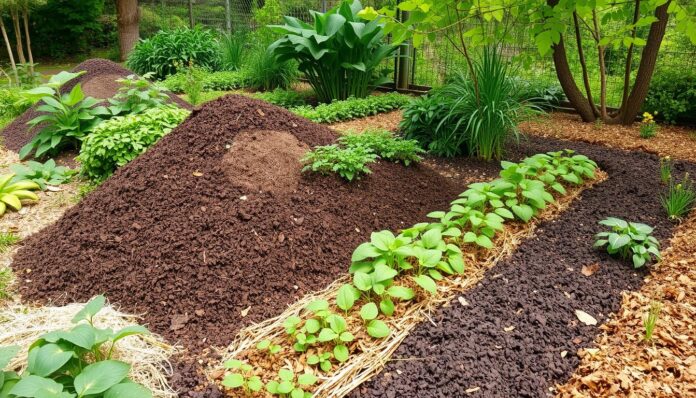What if the key to a thriving garden ecosystem lay in the soil itself? Permaculture soil amendments offer a sustainable solution to building a resilient and self-sustaining garden. By incorporating organic soil amendments and adopting sustainable gardening practices, gardeners can create an ecosystem that promotes healthy plant growth and minimizes environmental impact. With up to 42 different minerals necessary for the healthiest plants, using permaculture soil amendments can help provide the essential nutrients for optimal growth.
Permaculture soil amendments, such as compost and aged manure, can improve soil structure, prevent erosion, and feed soil microorganisms. By applying a recommended layer of compost, gardeners can create a balanced ecosystem that supports healthy plant growth. Organic soil amendments can increase beneficial soil organisms and improve moisture retention, reducing the need for frequent watering and minimizing nutrient leaching.
Key Takeaways
- Permaculture soil amendments can help build a resilient and self-sustaining garden ecosystem
- Organic soil amendments, such as compost and aged manure, can improve soil structure and promote healthy plant growth
- Sustainable gardening practices, including the use of permaculture soil amendments, can minimize environmental impact
- Up to 42 different minerals are necessary for the healthiest plants, making permaculture soil amendments a crucial component of a thriving garden ecosystem
- Permaculture soil amendments can help reduce the need for frequent watering and minimize nutrient leaching
- Compost and aged manure are effective permaculture soil amendments that can improve soil structure and promote healthy plant growth
Understanding Permaculture and Soil Health
Permaculture is a way to design sustainable ecosystems. It focuses on natural soil fertility and keeping ecosystems balanced. By using regenerative agriculture techniques, like crop rotation and composting, farmers can boost soil health and increase biodiversity.
Eco-friendly soil amendments, like compost and manure, improve soil fertility and structure. They also help beneficial microorganisms grow, which is key for soil health. By following permaculture and using these amendments, farmers can make our food system more sustainable and resilient.
What is Permaculture?
Permaculture is a design system for sustainable ecosystems. It works with nature, aiming for balance and diversity.
The Importance of Soil in Permaculture
Soil is vital in permaculture for plant growth and ecosystem support. Healthy soil is crucial for biodiversity, water filtration, and climate regulation.
Soil Microbiology and Plant Health
Soil microbiology is key for plant health and soil fertility. Microorganisms like mycorrhizal fungi and nitrogen-fixing bacteria support plant growth and soil structure.
Key Principles of Soil Amendments
To make a permaculture system thrive, knowing the key soil amendment principles is crucial. This involves making soil fertile, diverse, and better at holding water. Using nutrient-rich additives and eco-friendly gardening solutions can boost your soil’s health.
Building Soil Fertility
Adding compost or manure can help build soil fertility. These enrich the soil with nutrients, helping plants grow well. For instance, compost can make your soil hold more water, cutting down on watering needs.
Encouraging Soil Diversity
Soil diversity is vital for a healthy permaculture garden. This is done by planting a variety of plants, including native species. It creates a balanced ecosystem that supports many beneficial microorganisms and insects.
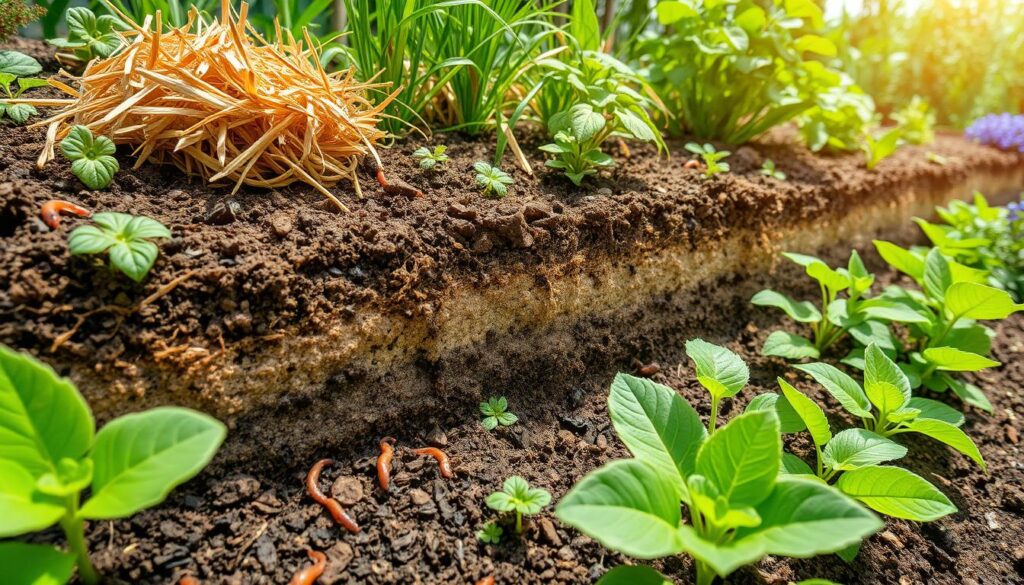
Enhancing Water Retention
Improving water retention is another important principle. Adding organic materials like wood chips or straw helps. These absorb and hold water, reducing the need for constant watering and preventing soil erosion.
Organic Matter: The Foundation of Soil Health
Organic matter is key for keeping natural soil fertility and supporting sustainable gardening practices. It makes the soil a home for good microorganisms. These microbes break down organic stuff and release nutrients for plants.
Adding organic soil amendments to the soil improves its structure and water retention. This helps plants grow strong and healthy.
Organic matter also acts as a slow-release fertilizer. It gives plants nutrients over time, cutting down on synthetic fertilizers. This is better for the environment and keeps the soil balanced.
It also fights weeds, so you don’t need to use harmful chemicals. This makes gardening safer and more eco-friendly.
Compost, mulch, and green manures are great for adding organic matter to the soil. They boost natural soil fertility and support sustainable gardening practices. Using these methods helps gardens grow well with less harm to the environment.
Green Manures and Cover Crops
Green manures and cover crops are key in regenerative agriculture. They help keep soil healthy and fertile. By using eco-friendly soil amendments like cover crops, farmers can improve soil structure and boost beneficial organisms. This makes the soil better overall.
Legumes like hairy vetch and winter pea are great for permaculture. They fix nitrogen. Cereal grasses, like oats and rye, create a dense root system. These cover crops enhance soil quality and provide food for wildlife.
Buckwheat grows fast and can be tilled under to enrich the soil. It’s important to consider when to plant cover crops. In Colorado, plant them by mid-October for fall crops. The ideal seeding depth is 1/4 to 3/4 inch.
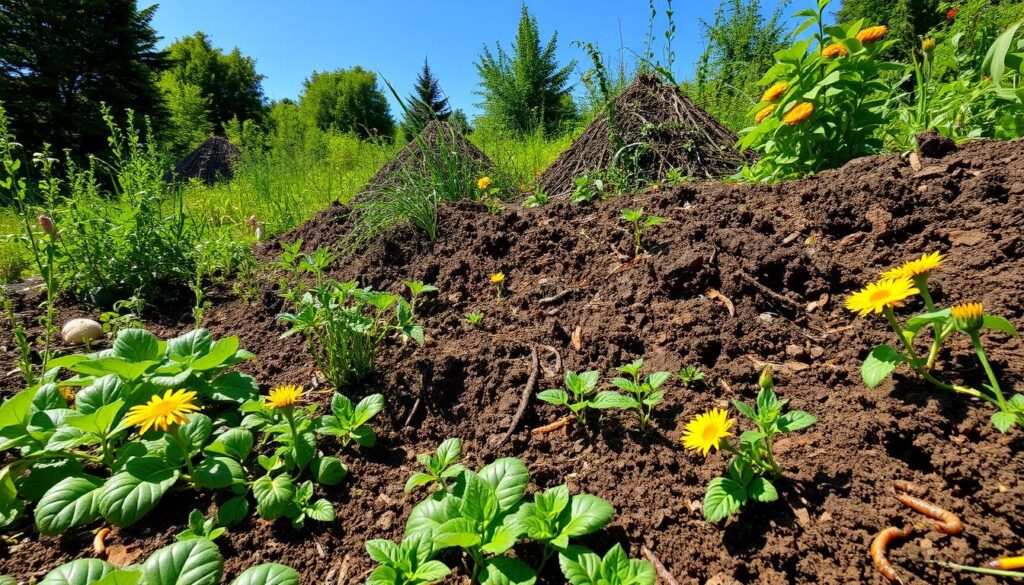
Green manures and cover crops offer many benefits. They improve soil fertility and structure. They also increase beneficial organisms and fungi. Plus, they provide food for wildlife.
By using these techniques, farmers can make their permaculture systems more sustainable and resilient.
| Cover Crop | Nitrogen-Fixing Properties | Desirable Seeding Depth |
|---|---|---|
| Hairy Vetch | High | 1/4 to 3/4 inch |
| Winter Pea | High | 1/4 to 3/4 inch |
| Oats | Low | 1/4 to 3/4 inch |
Utilizing Biochar in Permaculture
Biochar is a key part of permaculture, boosting soil health and fertility. It acts as a nutrient-rich soil additive, improving soil quality for plant growth. Using earth-friendly gardening amendments like biochar helps create a sustainable ecosystem.
Biochar’s main benefit is its ability to hold nutrients in the soil, providing a home for microbes. This makes it a great soil amendment for permaculture. To get the most out of biochar, mix it into the soil at a 10% to 15% ratio.
- Improved soil fertility and structure
- Increased water retention and drainage
- Enhanced microbial activity and diversity
- Reduced soil erosion and nutrient depletion
Adding biochar to permaculture systems makes them more sustainable and resilient. It helps grow healthy, abundant crops. Biochar is a natural, earth-friendly choice for soil amendments in permaculture.
| Benefits of Biochar | Description |
|---|---|
| Improved Soil Fertility | Biochar attracts and holds nutrients, providing a permanent housing for microbes |
| Increased Water Retention | Biochar helps to retain water in the soil, reducing the need for frequent watering |
| Enhanced Microbial Activity | Biochar provides a habitat for beneficial microbes, promoting a healthy and balanced ecosystem |
The Role of Worms in Soil Amendments
Worms are key in making soil better through vermicomposting. This is a big part of sustainable gardening practices. They break down organic stuff, making nutrient-rich castings. These are great for organic soil amendments.
Vermicomposting has many benefits. It makes composting faster. The worm castings are full of minerals, as the second web source says, “Worm castings are the richest fertilizer known to humans, and are high in minerals.” This makes it a good choice for gardeners wanting to boost soil health without synthetic fertilizers.
Benefits of Vermicomposting
- Enhances soil structure and fertility
- Increases the nutrient content of the soil
- Supports sustainable gardening practices by reducing waste and promoting natural soil fertility
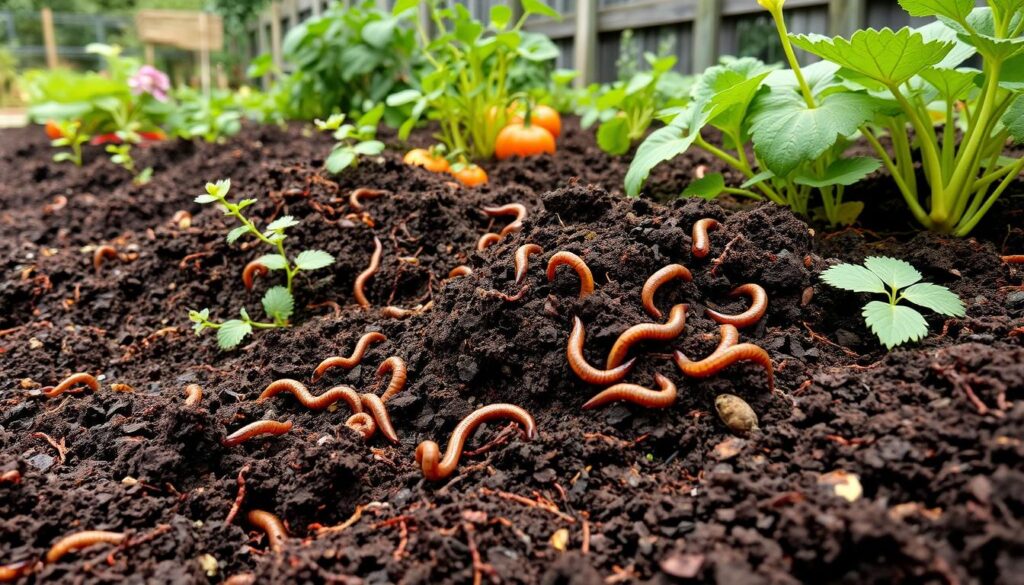
Creating a Worm Bin
To start vermicomposting, you need a worm bin. You can use plastic containers or wooden bins. The important thing is to make a comfy space for the worms. They need the right moisture, temperature, and food.
Nutrient Sources for Soil Amendments
Regenerative agriculture focuses on making soil fertile naturally. It uses eco-friendly soil amendments like natural fertilizers. These fertilizers give plants the nutrients they need to grow strong and healthy. Permaculture soil amendments use organic matter to balance the ecosystem.
Natural fertilizers include bat guano, which is rich in nitrogen and phosphorus, and compost tea, full of beneficial microbes. These can be mixed with minerals and micronutrients for a balanced diet. This approach helps farmers and gardeners avoid synthetic fertilizers and adopt sustainable farming.
Natural Fertilizers and Their Benefits
- Bat guano: high in nitrogen and phosphorus
- Compost tea: rich in beneficial microorganisms
- Manure: provides essential nutrients for plant growth
Minerals and Micronutrients
Minerals and micronutrients are key for plant growth. They can be added naturally, like with rock dust or seaweed. These provide nutrients like calcium and magnesium, vital for plants.
Balancing Nutrients in Soil
It’s important to balance nutrients in soil for healthy plant growth. By mixing natural fertilizers, minerals, and micronutrients, you can achieve this. This not only helps plants but also the whole ecosystem.
Utilizing Animal Manure
Animal manure is a valuable resource in permaculture. It adds nutrients to the soil, making it fertile and structured. Manure from animals like cows, pigs, and chickens is perfect for gardening. It’s a natural way to improve soil health.
Cow manure, for example, has 3% nitrogen, 2% phosphorus, and 1% potassium. This makes it a balanced fertilizer. Composting animal waste is key to break down harmful substances. It ensures the soil is safe for plants and the environment.
Different Types of Manure
Each type of manure has its own benefits. Poultry manure is great for adding nitrogen to crops early on. The nutrients in aged manure vary based on the animal and how long it’s aged. Knowing these differences helps use manure effectively.
Composting Animal Waste
Composting animal waste needs careful attention to temperature, moisture, and carbon-to-nitrogen ratios. Hot composting aims for a temperature of 55 degrees Celsius for days. The compost is full of life, boosting soil health naturally.
Applying Manure Safely
When using manure, safety is key to avoid contamination. It should be fully composted. Manure can be used in composting or as a top dressing for plants. This way, gardeners can create a fertile soil ecosystem.
| Manure Type | Nitrogen Content | Phosphorus Content | Potassium Content |
|---|---|---|---|
| Cow Manure | 3% | 2% | 1% |
| Poultry Manure | 4-5% | 2-3% | 1-2% |
Native Plants and Soil Health
Native plants are key to keeping soil healthy. They add natural soil fertility and organic soil amendments. By using native plants, gardeners can make their soil strong and fertile. This makes the soil better for plants and helps the garden grow well.
Research shows that microorganisms turn dirt into soil. Many plants, like natives, attract these microbes. This helps plants get nutrients and makes the soil better. For tips on using permaculture and regenerative gardening, check out this guide.
Benefits of Native Vegetation
Native plants bring many good things. They add variety, improve soil, and help the environment. They need less care and support local wildlife. Using native plants in gardens helps the planet and supports sustainable gardening practices.
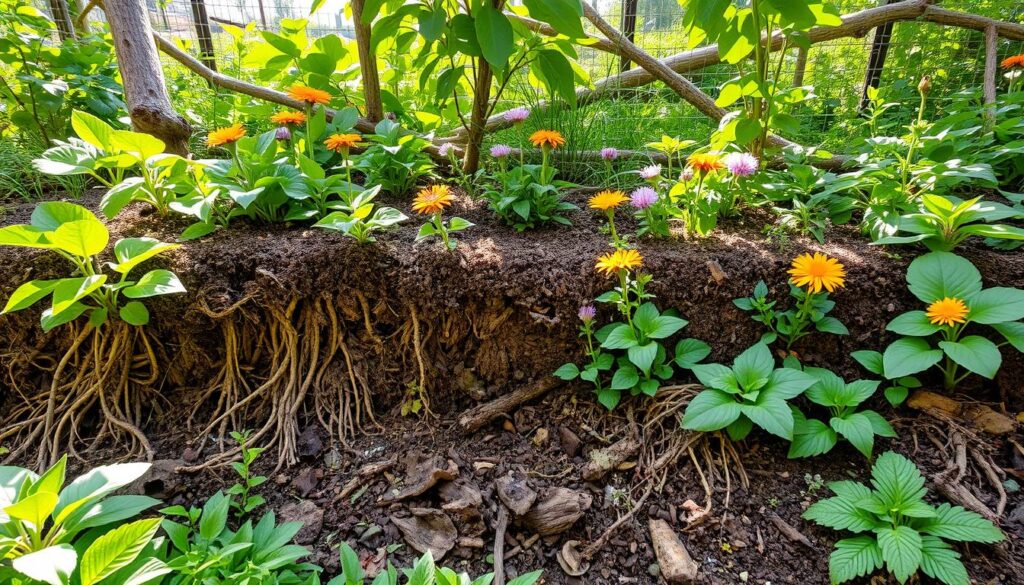
Integrating Native Plants into Systems
To add native plants to gardens, pick ones that fit your area’s climate and soil. Use companion planting to help plants grow better and fight pests. This makes a strong and varied garden that boosts natural soil fertility and organic soil amendments.
| Native Plant | Benefits |
|---|---|
| Wildflowers | Attract pollinators, improve soil health |
| Grasses | Stabilize soil, reduce erosion |
| Shrubs | Provide habitat for wildlife, enhance biodiversity |
Soil Testing and Analysis
Soil testing is key to knowing your soil’s health and fertility. This is vital for using regenerative agriculture techniques. It lets you check the soil’s pH, nutrients, and microbes. This info helps you choose the right eco-friendly and permaculture soil amendments.
To start, try pushing your finger into the soil. This can tell you about its texture and how it holds water. For a deeper look, send a soil sample to a lab for testing.
Why Soil Testing is Important
Soil testing is crucial because it shows you the soil’s ecosystem and where it needs help. It helps find out if there are good microbes for plant growth. This info is key for a balanced soil ecosystem, which is what permaculture is all about.
How to Test Your Soil
There are many ways to test soil, like DIY kits and lab tests. DIY kits can check the soil’s pH and nutrients. Lab tests give more details on microbes and nutrients.
| Soil Test | What it Measures |
|---|---|
| pH Test | Soil acidity or alkalinity |
| Nutrient Test | Levels of nitrogen, phosphorus, and potassium |
| Microbial Test | Presence and activity of beneficial microorganisms |
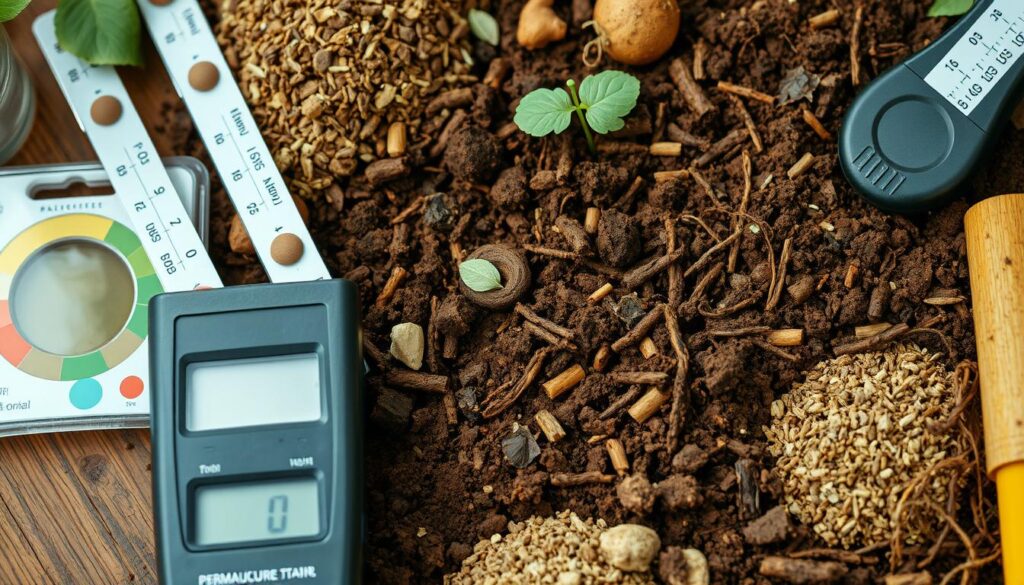
By mixing these methods, you can really understand your soil. This knowledge helps you make smart choices for regenerative agriculture and eco-friendly soil amendments.
Strategies for Managing Soil Erosion
Soil erosion is a big problem in the United States. Water erosion causes about 84% of it. To fight this, we need good ways to manage soil erosion. Using nutrient-rich soil additives and earth-friendly gardening amendments can help a lot.
Permaculture soil amendments are also key. Adding organic stuff like compost or manure makes soil hold water better. This lowers erosion risk. Also, planting cover crops keeps the soil in place with their roots.
- Planting cover crops, such as legumes or grasses, to stabilize the soil
- Using terracing techniques to reduce soil runoff
- Incorporating organic matter, such as compost or manure, to improve soil structure
These strategies help fight soil erosion. They make soil more stable. This is vital in permaculture, where we aim for a sustainable system. Using permaculture soil amendments and other green methods boosts soil health and cuts erosion risk.
| Method | Description |
|---|---|
| Planting cover crops | Helps to stabilize the soil and reduce erosion |
| Using terracing techniques | Reduces soil runoff and prevents erosion |
| Incorporating organic matter | Improves soil structure and reduces erosion risk |
Enhancing Soil pH with Natural Amendments
Soil pH is key to soil health and plant growth. Most plants do best in slightly acidic to neutral soil, with a pH of 6.5 to 7.5. To get this right, gardeners use organic soil amendments like elemental sulfur or lime. For instance, sustainable gardening practices often involve natural materials to adjust pH.
To lower soil pH, you can add elemental sulfur, peat moss, or compost. To raise it, lime or dolomitic limestone are good choices. It’s important to know that natural soil fertility comes from these organic amendments. They not only adjust pH but also feed plants with vital nutrients.
Here are some tips for using natural amendments to enhance soil pH:
* Elemental sulfur can lower soil pH, but it may take months to a year to see changes.
* Lime or dolomitic limestone can raise pH, but be careful not to overdo it.
* Mix organic soil amendments into the top 8-12 inches of soil for best results.
By following these tips and using natural soil fertility methods, gardeners can create a balanced soil ecosystem. This supports healthy plant growth. Always check soil pH and adjust as needed to keep your soil healthy and fertile.
The Role of Fungi in Soil Amendments
Fungi are key in soil amendments, mainly in regenerative agriculture techniques. They help make soil fertile and balanced, which is vital for plants to grow well. About 80% of plant species have fungi, and these fungi help plants fight off diseases.
Some benefits of fungi in soil include:
- Improving water retention in soil
- Enhancing nutrient exchange between plants and soil
- Breaking down complex organic compounds, making nutrients more accessible to plants
- Acting as natural filters in garden beds, breaking down contaminants and pollutants in water
To support fungi in soil, we need to use eco-friendly soil amendments and permaculture soil amendments. Adding organic stuff like compost or manure is helpful. Also, using fungal inoculants can help plants and fungi work together.
Using fungi in soil amendments makes our ecosystems more sustainable and balanced. This method cuts down on the need for harmful chemicals. It also helps plants grow strong and healthy, which is key in regenerative agriculture techniques.
| Benefits of Fungi in Soil Amendments | Description |
|---|---|
| Improved Water Retention | Fungi help improve water retention in soil, reducing erosion and runoff. |
| Enhanced Nutrient Exchange | Fungi facilitate nutrient exchange between plants and soil, promoting healthy plant growth. |
| Breaking Down Organic Compounds | Fungi break down complex organic compounds, making nutrients more accessible to plants. |
Implementing Crop Rotation
Crop rotation is key in permaculture, aiming to make soil strong and fertile. By changing crops, farmers use nutrient-rich soil additives better, needing less outside help. This method also keeps the soil healthy by not disturbing it too much.
There are many good things about crop rotation. It helps bring back 30% of the soil’s nitrogen with legume crops, cutting down on synthetic fertilizers. It also fights pests and diseases by changing what pests are attracted to, so less pesticides are needed.
Benefits of Crop Rotation
- Improves soil fertility and structure
- Increases crop yields and reduces pests and diseases
- Enhances biodiversity and ecosystem services
Planning a Rotation Schedule
Creating a rotation plan needs thinking about climate, soil, and what crops to grow. Farmers can use permaculture soil amendments to get the soil ready for each crop. A good plan means more food, healthier soil, and less harm to the environment.
Integrating Permaculture Design Principles
Permaculture design principles are key to a strong and fertile soil ecosystem. They help gardeners build a sustainable system that boosts natural soil fertility and cuts down on external inputs. A diverse and interconnected system is crucial for a thriving ecosystem.
Using organic soil amendments and sustainable gardening practices like mulching and composting are important. These methods help prevent soil erosion, improve its structure, and support healthy microbes.
Here are some benefits of integrating permaculture design principles:
- Improved soil fertility and structure
- Increased biodiversity and ecosystem services
- Reduced need for external inputs and synthetic fertilizers
- Enhanced water retention and efficient water management
By applying permaculture design principles and using organic soil amendments, gardeners can build a sustainable garden. This garden supports natural soil fertility and a healthy ecosystem. It also helps reduce environmental impact and supports long-term soil health.
| Permaculture Principle | Benefits |
|---|---|
| Use of organic soil amendments | Improved soil fertility and structure |
| Implementation of sustainable gardening practices | Reduced need for external inputs and synthetic fertilizers |
Monitoring Soil Health Over Time
Keeping your soil healthy is a long-term effort. It’s important to regularly check how well your soil is doing. Start by doing a thorough soil test to see how fertile, structured, and active your soil is.
Best Practices for Regular Monitoring
Set up a routine for checking your soil in the field. Use the 12 simple tests from the NRCS to track changes. These tests look at soil cover, residue breakdown, and more. Also, get lab tests done now and then to learn more about your soil’s nutrients and microbes.
Signs of Soil Health Improvement
As time goes by, you might see your soil getting better. You might notice more organic matter, better water absorption, and more life in the soil. These signs mean your permaculture efforts are working well.
Adjusting Amendments as Needed
Keep an eye on your soil’s health and be ready to tweak your amendments. If your soil needs more or different care, act fast. This will help keep your soil in top shape.
